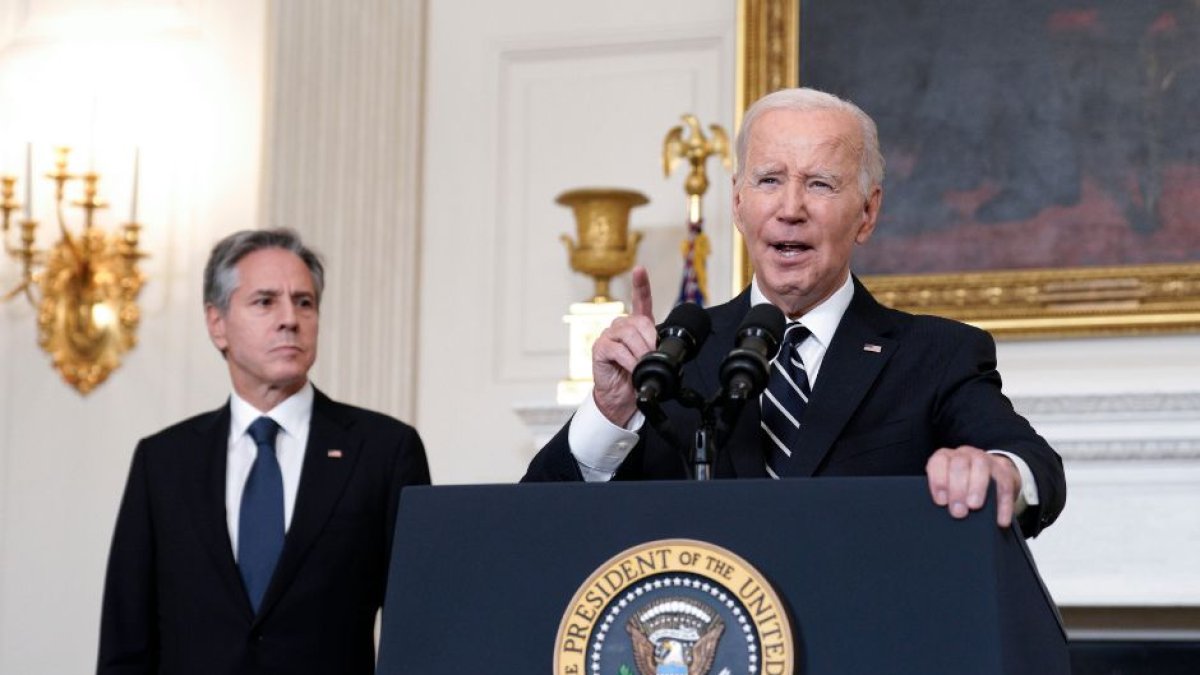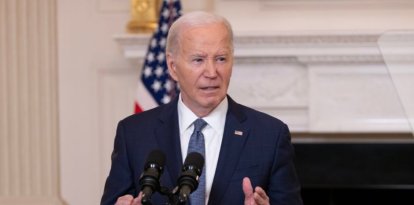Will Biden stand with Israel in the war’s next phase?
Appeasement of Iran helped make the Oct. 7 atrocities possible. Yet the president said the right thing in his first statement. What will he do when the counter-attack proceeds?

(Cordon Press)
President Joe Biden passed the first test of his leadership once Hamas launched its war on Israel. His policies of appeasement of Iran via ransom payments of billions of dollars and efforts to cut yet another weak nuclear deal had strengthened the terrorists. And his insistence on trying to force the Palestinian issue into negotiations between Israel and Saudi Arabia gave Hamas what they obviously thought was an opportunity to launch an attack that would bring them and their cause some political benefit.
But when he and U.S. Secretary of State Antony Blinken came out and faced the cameras in the White House on the afternoon of the first day of the conflict, what he said should have satisfied even the most ardent supporter of Israel.
This was no pro forma statement about reaffirming the alliance between the two countries. His characterization of the terrorist attacks was spot on. Unlike the mainstream corporate American media, he referred to it as “terrorism” and called their actions “unconscionable.” When he said, “Israel has the right to defend itself and its people. Full Stop,” that was exactly what the world needed to hear. The same could be said of his warning about “any party hostile to Israel” seeking to “exploit” the attacks for their advantage.
But as appropriate as that was and as helpful as any effort to ensure “that Israel has what it needs” in the coming days—assuming that an American military that has been stripped of its supplies of armaments and ammunition to assist Ukraine’s war effort is in any position to resupply the Israel Defense Forces—the real question about the Administration’s position remains unanswered.
It’s all well and good to express sympathy and support for Israel on a day when it has been attacked and hundreds of Jews have been murdered—not to mention the thousands of wounded and the more than 100 estimated to have been kidnapped and taken into captivity in Gaza by the terrorists. As anyone with even a cursory knowledge of modern Jewish history already knows, people love dead Jews, to quote the title of Dara Horn’s book of essays about antisemitism.
Yet after the initial declarations, what will Biden say and do once an invasion of Gaza begins and Palestinian casualties begin to mount with the international media, the foreign-policy establishment that produced most of his State Department and National Security Council staff, and the intersectional left wing of his party begins to talk about disproportionate force and the need for Israeli restraint? Will Biden’s support still be “unwavering and rock-solid?”
Will he make a distinction between Israel’s right to self-defense and security and a now all-too-necessary need to go on the offensive against the people who have slaughtered and abducted Jews?
Will he be pushing Israeli Prime Minister Benjamin Netanyahu to stop short of wiping out Hamas and its control of the Gaza Strip to avoid killing more terrorists and civilians or to preserve the mythical chances of a two-state solution that the Palestinians have consistently rejected?
Throughout the 51 years of his national political career, Biden has often spoken of his affection for Israel. However, his pro-Israel stance has always been conditioned on the Israelis doing as they were told by Americans like himself, who believed they often knew better than the leaders chosen by Israel’s people, about what was good for the Jewish state. He may believe that he cares for Israel, but the president has always been one of those who thought they could “save Israel from itself” even before that phrase became popular on the left.
In the coming days and weeks, that point of view is likely to be heard frequently in mainstream media discussions of the war.
Since the 2007 Hamas coup that gained the terror organization’s control of Gaza, Israeli leaders, including Netanyahu, have always held back from military operations that went beyond operations that were popularly characterized as “mowing the grass.” The conventional wisdom was that even though Ariel Sharon’s 2005 decision to withdraw every Israeli settlement, settler and soldier from Gaza was a disaster, reversing it was unthinkable. Hamas had transformed the small territory into a fortress which, while not impregnable, was still such a formidable position that retaking it could only be done at the cost of unacceptable Israeli and Palestinian casualties. The assumption has been that evicting Hamas was something that no Israeli leader was prepared to contemplate.
The atrocities of Oct. 7, the mass slaughter of Jews, and, as much as anything else, the videos showing the murders, desecration of bodies of the dead by the Palestinians and plight of the captives, including old women and children, may have changed all that.
It’s not just that the always cautious Netanyahu understands that after the epic failure of the security establishment—much of whose leadership made no secret of their antagonism for the prime minister in the last nine months of political conflict inside Israel—to prevent this invasion, his own legacy depends on a counter-attack that will be so decisive as to ease the sting of what happened on Oct. 7. It may also be true that Israel’s people are sufficiently outraged that they will be prepared to support the kind of costly military operations that will be needed to ensure that Hamas pays the ultimate price for its decision to go to war.
The sorrow and fear that the Hamas attacks have caused—and that may well last as long as the legacy of the Yom Kippur War, whose 50th anniversary was observed this past week—may have fundamentally transformed the political sensibilities of Israelis.
That may mean little to a Biden Administration still clinging to its delusions about the empowerment of a Palestinian national movement—whose fundamental intransigence and hatred was expressed by Saturday’s atrocities—as a path towards peace.
Biden knows that the sympathies of his party about the Middle East conflict have shifted in recent years. The most recent Gallup tracking poll showed that Democrats favor the Palestinians over Israel by a 49% to 38% plurality. By contrast, Republicans back Israel by a staggering 78% to 11% margin while independents side with Israel by 49% to 32%. That illustrates the growing power of the intersectional left that views Jews and Israelis as “white” oppressors and, regardless of the facts, the Palestinians as victims.
It also reflects the viewpoint of a mainstream liberal press that—as some of the initial coverage in outlets like The New York Times and MSNBC demonstrated—were ready to believe the lie that the Palestinians are only defending themselves by slaughtering Jews in their homes, as well as to conflate the totals of Israeli civilians who had been murdered with those of Palestinian murderers.
Israelis may now be prepared to pay virtually any price to rid Gaza of Hamas and ensure that Palestinians will never again be able to inflict such pain on them. But everything that Biden has done in the past and everything that is being said on the political left in the United States would tend to indicate that he and his party won’t go along with that.
It’s hard to imagine Biden being able to shake off his foolish beliefs about the Palestinians wanting peace and the need for suicidal Israeli territorial surrenders that have always colored his stance on the Middle East. Even if he were, he will come under enormous pressure to make Netanyahu stop the counter-attack on Gaza long before it achieves even its most minimal goals. That will come from his political base, his press cheerleaders (who have relentlessly defended him from charges about his family’s corrupt business activities and policy failures since entering the White House) and from within his own foreign-policy team largely composed of Obama alumni who are inveterately hostile to the Jewish state.
The Palestinians’ crimes may have made it imperative that Israel not accept a return to a status quo that enables the terrorists to pose an ongoing threat. Netanyahu is likely to have the domestic support he needs to do whatever is needed—no matter how many human shields in Gaza are harmed—to guarantee that Hamas and the Palestinians are defeated in this war rather than benefiting politically.
The ultimate test of Biden’s claim to pro-Israel bona fides is whether his Administration will back such an outcome rather than, as U.S. Secretary of State Henry Kissinger did in 1973, seek to give Israel just enough support to survive but not to win decisively. If he backs away from Israel as the war enters its next phase, then anyone who claims to be a supporter of the Jewish state must judge him accordingly.
© JNS
























